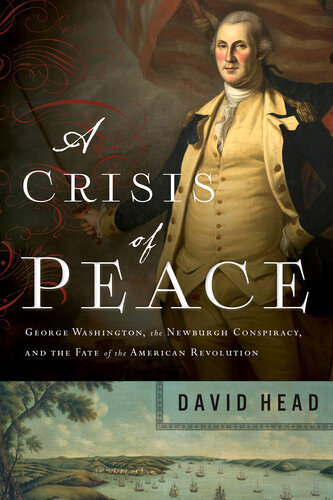
A Crisis of Peace
- اطلاعات
- نقد و بررسی
- دیدگاه کاربران
نقد و بررسی

October 1, 2019
A tale from the very beginnings of the republic--and of its disaffected military. As Head (History/Univ. of Central Florida; Privateers of the Americas: Spanish American Privateering From the United States in the Early Republic, 2015, etc.) observes early on, the British didn't march away after Yorktown, never to return. Instead, they retained control over New York as well as Savannah and Charleston and held them for another year and a half until the Treaty of Versailles was ratified. George Washington took his tired army to the banks of the Hudson River to keep an eye on the British, and there, at Newburgh, a "crisis of peace" emerged, one that pitted some of Washington's officers against Congress. For its part, the Continental Army was still irregularly equipped and poorly paid while Congress and its civilian employees counted on regular paychecks and led comfortable lives in Philadelphia. Head recounts the origins of the revolt that came close to erupting within the ranks of the revolutionary forces, pitting the military against the government. Along the way, he examines Congress' monetary policy and notes that financing the Revolution had led to near ruin not just because of the huge cost of the war, but also its inability to collect taxes across state lines, leading to "a canyon of debt" that made the dollar effectively worthless. Robert Morris, appointed superintendent of finance, floated credit from his own fortune until Alexander Hamilton could come along to straighten up the house, even as Washington quelled an uprising in the making that might have allowed Britain "to steal a victory in the end." The author's narrative has its moments, but his approach is of the rocks-for-jocks and gods-for-clods variety, as when he adverts to The Godfather ("But just when Morris thought he was out, Congress and the army pulled him back in") and affects breeziness ("the British Army was really good"), slips that do the book no favors. A footnote to the larger history of the Revolution, of some interest to buffs.
COPYRIGHT(2019) Kirkus Reviews, ALL RIGHTS RESERVED.

October 14, 2019
Revolutionary War buffs will be intrigued by this meticulous, narrowly focused account of the two years following British Army general Charles Cornwallis’s surrender to Continental Army commander-in-chief George Washington in October 1781. University of Central Florida professor Head (Privateers of the Americas) explains that, with peace under negotiation in Paris, British forces still occupied New York City, and 10,000 Continental troops “stood duty” in the vicinity of Newburgh, York. During the winter of 1782–1783, army officers grew anxious about their pensions, which had been promised by Congress but were now in doubt because the country was “deeply in debt” and taxes were “deeply unpopular.” An officer, later revealed to be Maj. John Armstrong Jr., distributed an anonymous letter calling for the army to defy orders to either disband (if peace came) or fight (if war resumed). Head convincingly debunks theories that the letter was part of a conspiracy hatched by “nationalist-minded” politicians, including Alexander Hamilton, who wanted greater powers for the federal government, and finds no evidence that officers sought to overthrow Washington. He praises the commander’s ability to restore order, and thoroughly details how the army came to terms with Congress. This accessible history illuminates an obscure but significant chapter in American history.

November 1, 2019
Head (history, Univ of Central Florida, Privateers of the Americas) considers the evidence and provides an authoritative, well-researched account of George Washington's role in resolving this near-crisis of the "Newburgh conspiracy" of 1783, a murky affair. Because peace was not formalized in colonial America after the British surrendered at Yorktown (1781), British troops continued to hold possession of some former colonies; an army was needed in case negotiations broke down. Time dragged on. Revolutionary officers faced the prospect of returning home with no compensation for their years of service. Tensions grew as Congress dithered. An anonymous letter circulated, threatening action if Congress ignored the soldiers' legitimate request for compensation. Head hones in on how Washington, who initially kept his distance from the malcontents, was persuaded to speak to the officers and report their concerns to Congress. VERDICT This straightforward account will appeal principally to Revolutionary War buffs.--David Keymer, Cleveland
Copyright 2019 Library Journal, LLC Used with permission.




دیدگاه کاربران